Diary of Anais Nin Volume 3 Read online
Page 2
She has arrived at a different assessment of her relationship with her father: "If, for example, my father had not been my father but a friend, I would have appreciated his scholarship, his musical erudition, his gift for creating an atmosphere, his wit in the world, his talent for storytelling, his charm. But because he was my father and a certain role was assigned to him, a certain expectation was created in me. It was by measuring his behavior according to the expectations of a daughter that I found him wanting."
She regards her rebellions with a different eye: "Very often I would say I rebelled against this or that. Much later it occurred to me to question this statement. Instead of rebellion could it be that I was merely asserting my own belief?"
Her introspection shifts from her own emotions to the emotions of her friends, to a clearer assessment of her craft, her search for new forms to embody a larger consciousness, new symbols to be found in science and technology.
In the face of the spreading war, of the annihilation of the Old World, she also clings to the course set for her own life by her first American experience: "The worse the state of the world grows, the more intensely I seek to create an inner and intimate world in which certain qualities may be preserved." It is her steady, unswerving answer to chaos, loss, and destruction.
In reviewing the small, handset edition of Under a Glass Bell, in 1944, Edmund Wilson remarked that these stories "take place in a special world, a world of feminine perception and fancy which is all the more curious and charming for being innocently international." Two of the keystones of Miss Nin's lifework, indeed, are feminine perception and a true internationality. Both were born of the special circumstances of her life. In her struggle for independent creation as a means of survival, she employed, rather than rejected her strength as a woman. ("Contrary to most creative women of our time," she notes in these pages, "I have not imitated man, or become man.") In her fight against dislocation, she also rejected neither the past nor the future—Europe or America—but fused them into a genuine artistic internationalism, a bridge from yesterday into tomorrow. (Ironically, while until recently America regarded her as a "foreign" writer, her novels were published in France, in the 1960's, as "romans Americains.")
The present volume, drawn from the original volumes 60 to 67 of the Diary, links directly with the two previously published volumes, covering the years 1931–34 and 1934–39. Personal and legal reasons made the omission of certain persons again obligatory and a few names were changed or eliminated. Pseudonyms are indicated as such in the index. The dates in brackets supplied by the editor are again merely intended to indicate the passing of time since the dates given in the originals are sometimes confusing, due to later elaboration of events, and an actual chronology seemed preferable.
As the Diary unfolds, as new sections of Miss Nin's lifework become available, a thought she jotted down here as a theme for a future book might serve, perhaps, as an epigraph for the Diary itself: "There are few human beings who receive the truth complete and staggering, by instant illumination. Most of them acquire it fragment by fragment, on a small scale, by successive developments, cellular, like a laborious mosaic.
New York
April 1969 GUNTHER STUHLMANN
[Winter, 1939]
I left a Paris lit in a muted way like the inside of a cathedral, full of shadowy niches, black corners, twinkling oil lamps. In the half mist hanging over it, violet, blue, and green lights looked like stained-glass windows all wet and alive with candlelight. I could not have recognized the faces of those I was leaving. My bags were carried by a soldier whose shoes were too big for him. I suffered deeply from the wrench of separation. I felt every cell and cord which tied me to France snapping in me, the parting from a pattern of life I loved, from an atmosphere rich, creative and human, from intimacy with a people and a city. I was parting from a rhythm rooted very deeply in me, from mysterious, enveloped nights, from an obsession with war which gave a bitter and vivid taste to all our living, from the sound of anti-aircraft guns, of airplanes passing, of sirens lamenting like foghorns on stormy nights at sea.
I could not believe that there could be, anywhere in the world, space and air where the nightmare of war did not exist.
On the train to Irún. On the way to take the hydroplane from Portugal. It seems as if I will never tear myself away from France. Each mile of the journey, each landscape, each little station, each face, causes a painful separation. I carry with me only two briefcases filled with recent diaries. At the last moment, when I had taken all the volumes out of the vault in the Paris bank and packed them in two suitcases, I found that the cost of excess weight far exceeded the money I had. So the bulk of the diaries went back into the vault. And now, in the train, I feel despondent, ashamed to be saved from catastrophe, to abandon my friends to an unknown fate.
For the second time in my life, America looms as a refuge. My mind is journeying backwards in time. I think of the Maginot Line, which crossed near Louveciennes, in the Forest of Marly. We stumbled upon it one day on a hike. A young soldier took us through part of it. He was very proud. A cement labyrinth with apertures only for gun barrels. He showed us a vast empty pool, which he explained would be filled with acid to dissolve the bodies of the dead. I think of my concierge, who lost her husband in the First World War and might lose her son in the Second. I think of the Pierre Chareaus in danger because they are Jews, and those who escaped from Germany and are now once more afraid for their lives
At Irún there was a period of waiting, a change of trains. I took a walk. A wall behind a church, at the top of a hill. I turned my back on it to look at the church. I felt pains in my back. I turned around. Suddenly I noticed that the wall was pitted with bullet holes. A passer-by said: "Thousands of Spaniards were executed here." Vestiges of destruction all around me. Children playing in the ruins of buildings.
The train again. Portugal. I cannot smile at the sun. I cannot smile at the white buildings, the women in black, at the wild flowers and the singing in cafés. I am in mourning for France.
The hydroplane is poised on the water. The refugees cheer. Escape! A woman takes me to the ladies' room to search me, to see that I am not carrying a revolver, a camera, or gold. To get inside the hydroplane we walk on its wing and enter through an opening in its belly. The metal is the same color as the sea. It seems too heavy to fly. As it courses along the water with one engine starting, then another, gathering speed but bumping against the waves, I feel as if in a nightmare when one cannot fly upward even though menaced by great dangers.
Strange that when we finally fly, the separation from the past seems easier to achieve. Height and distance from the earth seem to stabilize the spirit, to liberate it from its sorrows. We enter the consciousness of the cosmos. The face of Europe grows smaller.
Now there are only sky and clouds.
We land in the Azores. Legend says this is the part of Atlantis which did not sink. Black coral rocks, black sand from volcanic eruptions. Pastel-colored houses clinging to the rocks. A soft grey drizzle. The houses lean against each other, shaky and frail, like Utrillo's houses. Women pass by in long dark capes, their faces hidden in large hoods supported by frames, like nuns' hoods inflated by the wind.
When we leave the Azores after refueling, the hydroplane again seems too heavy. The sea is stormier, and we have difficulty in taking off. The waves buffet the windows. We rise after a great struggle.
Night. The stars and the moon impassive, undisturbed, eternal. A little of their impassivity flows into me. They are consoling. They reduce the intensity and acuteness of human sorrow. I feel less strangled, less oppressed. I transfer to the moon and the stars some of the trust in God I once had, and realize that serenity comes from an acceptance of death. Man's life span is short. There is an end to pain.
After dinner the bunks are pulled down. I lie down and open my briefcases. I lie awake, rereading the last letters I received, and writing in the diary. The essence of all I have lived in the last ten yea
rs rests in these briefcases. I have run away with a part of my treasures, my memories, my obsession with preserving, portraying, recording. All of us may die, but in these pages we will continue to smile, talk, make love.
The first letter I reread is from Conrad Moricand. He wrote in pencil, while with the Légion Étrangère, before they discovered he was too old and sent him back to Paris. He wrote after reading Winter of Artifice:
At one time I might not have appreciated your novel because of its temporal quality. Its concern with what Max Jacob once defined cruelly as "those tales about Adam and Eve." This in spite of your gift for analyzing quarter tones and your lucidity which makes me tremble at times. This human world you explore with so much skill was an unknown world to me, voluntarily repudiated by me. I was very young when I detached myself from life in the raw, when I became disincarnated. All I wanted then was to rise above contingencies, to be able to distill an essence. I accepted the role of a spectator (which is all I have been, a passive spectator), not a participant. Today, old and worn out, I am no longer proud of my attitude. I begin to suspect my own heart, which I had thought to be warm, and ask myself if as a cold observer in the face of la vie saignante, which alone contains the pulse of life, I did not commit a sacrilege, a blasphemous indifference and detachment. Perhaps I deserved the death-dealing lightning blows of Anteros, the god who punishes those who have not loved. Witness this old naturalist studying the phenomenon of life under his astrologic microscope, and being now miraculously moved by your closeness to life. The poet in me, which you so charitably discerned, was precisely the instrument I used to keep life at a distance, a distance which I now believe was far more than an abdication, a sort of cheating, of evading life, because one must respond, one must feel. One must know tenderness, but with my temperament, a man incapable of love, as I have been, as I am, my somersaults towards heaven were only a derivative, an ultimate cheating. I took refuge in a cosmic existence. It was a very cold region, dear Anais, and the great Pascal was aware of this long before I was. To define you I can find no better adjective than emotional cosmic sense, when I observe this many-faceted heart of yours, its multiplicity of contacts, its ramifications. Your book gave me a nostalgia for an earthy life, earthy and consuming, which I missed in my chimerical quest for wisdom and serenity, my no man's land peopled only with the ugly cactus of solitude. If I had a choice, I would choose your way. Your weighing machines, so precise when it comes to weighing the imponderable...
Woman has to be reminded constantly of the vaster, mythical and cosmic worlds. That is where man finds his strength. Jean [Carteret] sought to remind me of this in Saint-Tropez. He asked me not to look upon painful events and experiences which beset me as death-dealing or withering, but as mere storms which carry away dead leaves without destroying the trees....
You must not get trapped in humanity and its struggles. You must keep alive your contact with all things, your relationships to all kinds of people. When you are too much invaded by others' discords, when you are driven by scruples or guilt to retrogress in order to help others live, and when they try to crystallize you in one role, you lose your ability to maintain and sustain the flow, you arrest the turning of the bigger wheels, you get caught in the spokes.
The last letter from Lawrence Durrell, written from Greece:
DEAR:
This is so long overdue that it is past all apology; I have been writing you a portmanteau letter for some time, but have decided not to send it. Such a void yawns when we turn our mind northwards and think of you entombed in the European cities with your gas masks and thoughts. It is something that the war does: Dissolves and untightens purpose, so that one's friends move about in the still places of the imagination like candlelit fellows, not quite belonging to the past, but without future and form. There is a little leafy square opposite the Closeries des Lilas, where sometimes I wait for you to pass in your cloak, going homeward. Darling Anais, I do feel for you in your cutoffness; and there seems nothing to say to you that will make you less conscious of the distance of light and air which lies between us; the war goes deep and bitter in me—it makes everything taste of ash. The success of the three musketeers, * the success of your book, above all, which just rode the crest in its gay cover, the third musketeer; a success which is swallowed suddenly in the blackout and the alarms. I was writing a long thing to you about how we lost the island; how the autumn came down in a sudden sweep of pearl and black—a terrific slow augur as war was breaking. I can never really recapture the way we stood on the balcony and watched the green rain falling in the sea, a kind of pitiful last will and testament ending the summer. The sea tossing its mythological blue like the mane of horses. The island went down in the smoke and here we are in the city, no Jess fabulous but built in heavy ringing strokes of white and red; all the contour and curvature of the world which gave us a sea outside our house is gone. We left Henry. He is in a strange state, pitched in too high a key, a little hysterical with light and air, but physically fit as a drum. There is something deeply wrong about his attitude towards the world, but I cannot say what it is. He himself feels it, and takes pains to justify his "egotism" as you call it; perhaps if it were unconscious of itself his egotism would become true detachment. In some inner way he refuses to grow; but it is only a phase of his growth. There always was that lovable myopia in him to everything except his own processes. And the war is too big a thing for him to swallow; he must reject it. He is enchanted by Greece, the air is so kind to him, and the scenery so crystalline; but it has made him dumb. He cannot speak any more.
For my part I feel completely hopeless inside; it is so good to be working at the trivial all day and drinking retsina at night. My heart shrinks when I read the manifestoes of the leaders, when I really see the pygmies at work in the world with their hysteria and violence. We do not speak about the war here, but it is a kind of weight we carry among us, among our frivolities. The radio pours in its news all day; we file and counterfile political theories; we write long and meaningless memoranda on official paper about the number of pens in the office. Tomorrow it all ceases. A new specimen of civil servant has arrived from London and has closed down this department, believing that propaganda is not necessary here. I shall be left to my own devices tomorrow; I don't know whether writing is any kind ol anodyne. 1 must try. We have a balcony here also from which the Acropolis shines in the mist all day; but the war eats into one slowly, symptom of the inner war of Europe, the pragmatist's disease. I feel entitled to none of this clear, poignant, peaceful Attican country, the blue and the white and green; or the curved sky at night with its brilliant stars. I would like to break you a morsel of this land and send it to you to keep under your pillow like a wedding cake.
The money question is going to be a problem unless I find some other job; a serious, a laughably serious question. In fact, if I don't we shall be en route for France very shortly. Life is very black for us all; no hopes, no solutions in sight. Only there is a kind of imperative at the bottom of things which tells me that we must bear our tears gracefully.
I was asleep when a storm awakened me. Hail, snow, lightning. Gradually everyone awakened and dressed, chose to sit up, clutching at some precious possession. One cannot see the ocean. The clouds are black and dense.
Why does the dialogue with Moricand continue through the voyage? He was not the most important of my friends. Was he a symbol of old forms I would never see again? All my life, it seems, first with my father, and at the end with Moricand, I admired form and discipline and rejected them as interfering with life and nature. I loved form, but not formality. I loved discipline, but not rigidity. Yes, of course, the dialogue with Moricand is a continuation of my dialogue with my father. The icy formality an insulation from feeling. Yet in the midst of chaos and hysteria in Paris I sought form in Etsu Inagaki Sujimoto's Fille de Samurai. Style. I loved Jeanne because she was a poet, I followed her into her world and bruised myself against her social conventions, class distinctions, upp
er-class taboos, so contrary to her own essence. And the same with Rebecca West. This formality, all the things one could not say, or do, or enter, irritated me in Moricand, too. At some point this formality would break down (with my father, with Moricand when he read Winter of Artifice).
Moricand's letter was a cry of sorrow at having missed human life out of overrefinement, squeamishness. But he confessed his unnaturalness, and when he did so, I also became aware of the beauty of this form, this stylization, this discipline, which may have been, beyond social forms and rigid etiquettes, an attempt to control nature. I was not only saying farewell to Moricand but also to a form of culture personified by Moricand. Grace of bearing, grace of the spirit, the masking of one's failings, anguishes, to present to the world only a smiling face and witty façade. Poetry become a heroic act. Sense of ceremony and ritual a sacred duty, to add to the beauty of the world. Henry [Miller's] courage consisted in immersing himself in all experience, without repulsion. My father's and Moricand's courage lay in resisting ugliness, sordidness, in selectivity, in repudiating the lower depths.
I wish I had all my diaries with me, for if we sink they would sink with me and no one would ever be hurt by the truth.
I had to leave Helba and Gonzalo in Paris, waiting for their consulate to repatriate them. I left Gonzalo my first edition of Proust to sell in case of need. I left my furniture and books in storage.
They say the war will be over soon.
To continue living in the past I read another letter from Moricand:
We are stranded in a snowstorm. As we have not yet received our uniforms, and our woodcutting chores, digging trenches, and eating keep us out of doors, we look like sordid hobos. My raincoat is a rag, my shoes a stew. We chopped wood in freezing weather. We sleep in barns, on the straw. Two men were jailed for keeping their hands in their pockets.

 Diary of Anais Nin, Volume 5
Diary of Anais Nin, Volume 5 A Spy in the House of Love
A Spy in the House of Love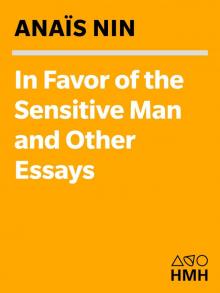 In Favor of the Sensitive Man and Other Essays (Original Harvest Book; Hb333)
In Favor of the Sensitive Man and Other Essays (Original Harvest Book; Hb333)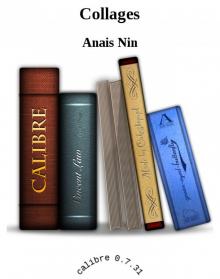 Collages
Collages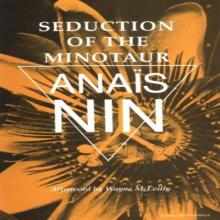 Seduction of the Minotaur
Seduction of the Minotaur Children of the Albatross
Children of the Albatross Delta of Venus
Delta of Venus The Four-Chambered Heart coti-3
The Four-Chambered Heart coti-3 Diary of Anais Nin, Volume 2
Diary of Anais Nin, Volume 2 Diary of Anais Nin, Volume 1
Diary of Anais Nin, Volume 1 Diary of Anais Nin, Volume 4
Diary of Anais Nin, Volume 4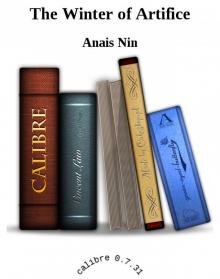 The Winter of Artifice
The Winter of Artifice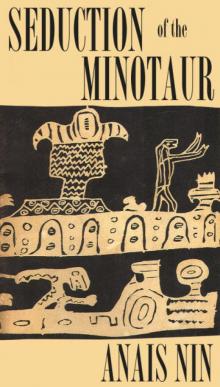 Seduction of the Minotaur coti-5
Seduction of the Minotaur coti-5 Children of the Albatross coti-2
Children of the Albatross coti-2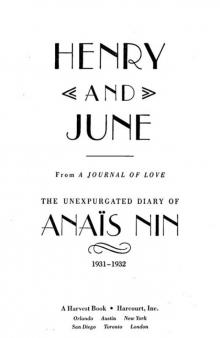 Henry and June: From A Journal of Love -The Unexpurgated Diary of Anaïs Nin (1931-1932)
Henry and June: From A Journal of Love -The Unexpurgated Diary of Anaïs Nin (1931-1932) Ladders to Fire
Ladders to Fire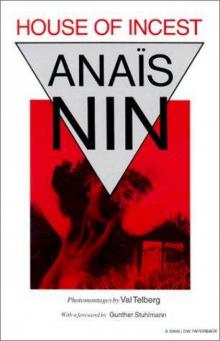 House of Incest
House of Incest